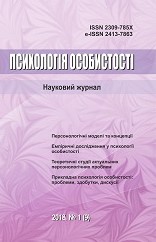МЕТАТЕОРЕТИЧНІ КОНЦЕПТИ ПІЗНАННЯ СВІДОМОСТІ
DOI:
https://doi.org/10.15330/ps.9.1.5-11Ключові слова:
свідомість, буття, метатеорія, концепт, поліметодологія, методологування, свідома здатність, метамова, інтерпретація, свідомий досвід, : consciousness, being, metatheory, concept, polymethodology, methodologization, conscious ability, meta-language, interpretation, conscious experienceАнотація
У ХХ столітті ідейно виокремилися, набули епістемологічного усистемлення та культурної значущості дві головні парадигмальні течії наукового конструювання теорії свідомості – граматологічна та онтологічна, що сутнісно різняться своїми засновками і концептами, поняттями і моделями, концептуальними і теоретичними побудовами, а головне – відмінною методологічною оптикою як обґрунтованим набором форм, методів і засобів дослідницької миследіяльності. У гносеологічній площині висвітлення зазначеного поля теоретизування альтернативність названих течій стосується заперечення або обстоювання метафізичного статусу свідомості поза знаковим простором, відкиданні або прийнятті форми чи так званої «чистої форми» за сутність свідомості й відповідно в нівелюванні або рефлексивному опрацюванні свідомості як трансцендентного засновку і водночас як онтологічно вкоріненої подієвої властивості – як сфери не-реального позалогічного буття: щоб бути вактуальненим свідомий акт-досвід має постійно розпросторюватися назовні, за межі реальності, себто перебувати у стані безупинного цілісного трансцендування. В методологічному аспекті відмінність вказаних течій підтверджують автономні поняттєво-категорійні тезауруси, дослідницькі стратегії і мислекомунікаційні дискурси, самодостатні набори методів, процедур, засобів та інструментів методологування. Загалом полярність світоглядних картин і способів розуміння сутності та феноменальних оприявнень свідомості відображають (1) різні епістемологічні витоки, першопочаток яких закладено відповідно М. Гайдеґґером та Е. Гусерлем, (2) альтернативні парадигмальні позиції у визначенні філософського статусу свідомості, її сутнісного відповідника у соціальному повсякденні і культурі, (3) сучасні теоретичні прориви моно- і полідисциплінарних досліджень, здійснюваних у контекстному форматі розгортання метамодерністських тенденцій розвитку психології і гуманітарних наук у цілому, (4) метолодогеми як більш-менш збалансовані системні єдності принципів, підходів, парадигмально-дослідницьких карт, типів наукової раціональності і термінологічного ладу. Різнобічно аргументована панорамна своєрідність прийнятого до реконструкції метатеоретизування, що уможливлює вивчення свідомості безвідносно до культури, зовнішнього світу; беззмістовно, із формальних позицій, безособово і безсуб’єктно, опосередковано, в непрямий спосіб, із широким задіянням новітніх ресурсів метаметодології відносно трансцендентного засновку – форми як сутності свідомості. Доведено, що розробка метатеорії свідомості на істотно інших методологічних засадах становить важкодоступний обхідний шлях фіксації, опису і доконструювання умов розвиткового функціонування свідомої здатності людини бути усвідомлено присутньою у світі й оприявнення останнього у сферному засвіті трансцендентного життєпотоку свідомості
Two main paradigmatic streams of the scientific theory construction of consciousness ideologically were singled out, acquired epistemological systematization and cultural significance in the twentieth century – gramatological and ontological, essentially differing in their foundations and concepts, notions and models, conceptual and theoretical constructs, and most importantly - in distinctive methodological optics as a well-founded set of forms, methods and means of research mind activity. In the epistemological plane of this field of theorizing illumination, the alternativeness of these streams refers to the negation or advocacy of the metaphysical status of consciousness beyond the sign space, the rejection or acceptance of the form of the so-called "pure form" for the essence of consciousness and, accordingly, in leveling or reflexive elaboration of consciousness as a transcendental foundation and, at the same time, as an ontologically rooted step-by-step trait – as a sphere of unreal out of logical being: to be actualized, a conscious act-experience has to constantly spread outside, beyond the bounds of reality, that is, to be in a state of continuous holistic transcendence. In the methodological aspect, the difference between these streams is confirmed by autonomous conceptual-categorical thesauri, research strategies and thought communication discourses, self-sufficient sets of methods, procedures, means and tools for methodologization. In general, the polarity of worldview pictures and ways to understand the essence and phenomenal disclosures of consciousness reflect (1) various epistemological origins. The first of which is laid down, respectively, by M. Heidegger and E. Husserl, (2) alternative paradigmatic positions in determining the philosophical status of consciousness, its essential match in the social everyday life and culture, (3) modern theoretical breakthroughs of mono- and polydisciplinary studies carried out in the context-based format of the development of metamodernist trends in the development of psychology and humanities as a whole, (4) methodologems as more or less balanced system unities of principles, approaches, paradigm-research maps, types of scientific rationality and the terminological system. Variously reasoned panoramic peculiarity of metatheorizing adopted for reconstruction, which makes it possible to study consciousness without regard to culture, external world; meaninglessly, from formal positions, impersonally and subjectivelessly, indirectly, in indirect way, with the wide involvement of the newest resources of meta-methodology with respect to the transcendental foundation – a form as the essence of consciousness. It is proved that the development of consciousness metatheory on essentially other methodological grounds is a hardly accessible workaround of fixation, description and designing the conditions of developmental functioning of the conscious human ability to be consciously present in the world and the presentation of the last one in the sphere illumination of the transcendental life flow of consciousness.

